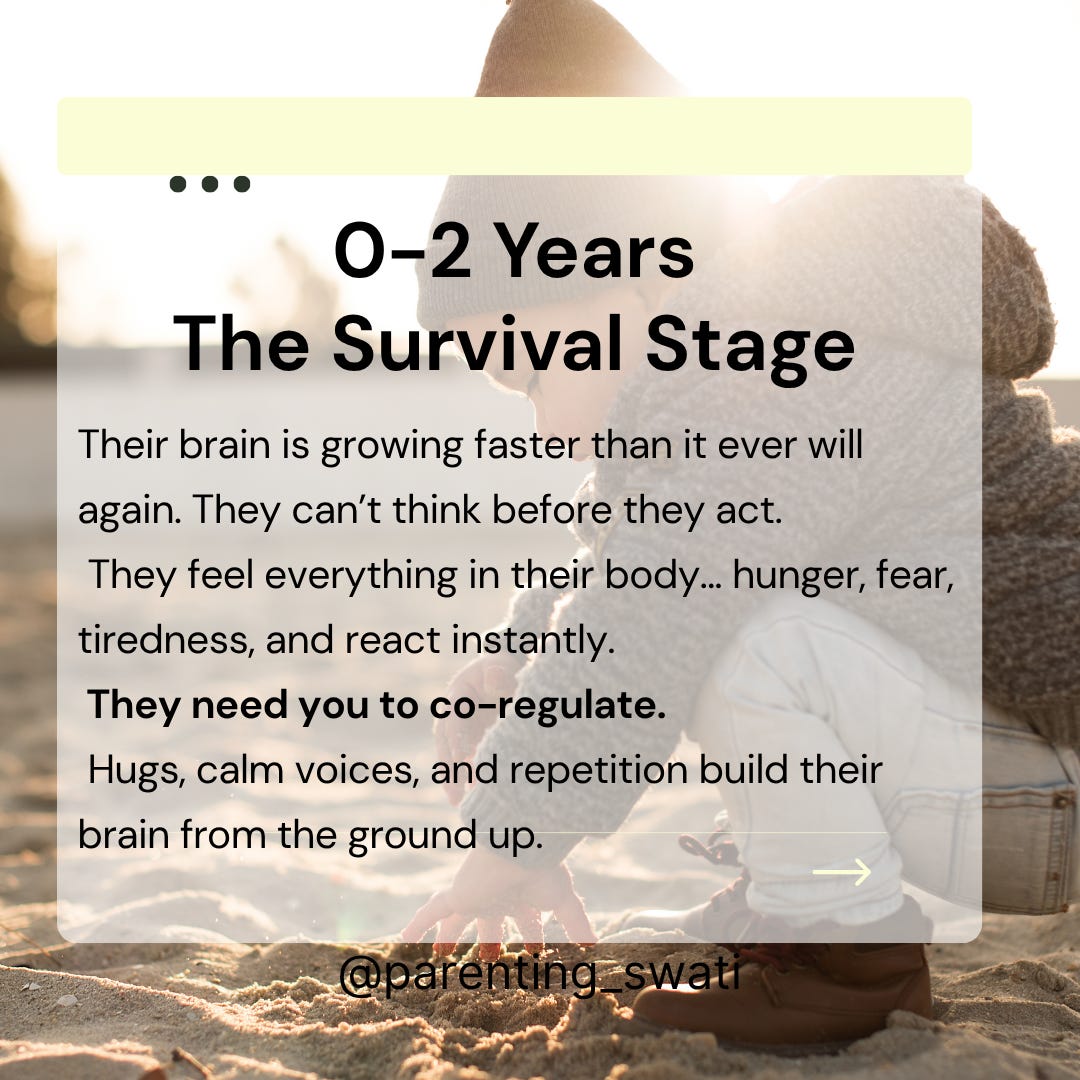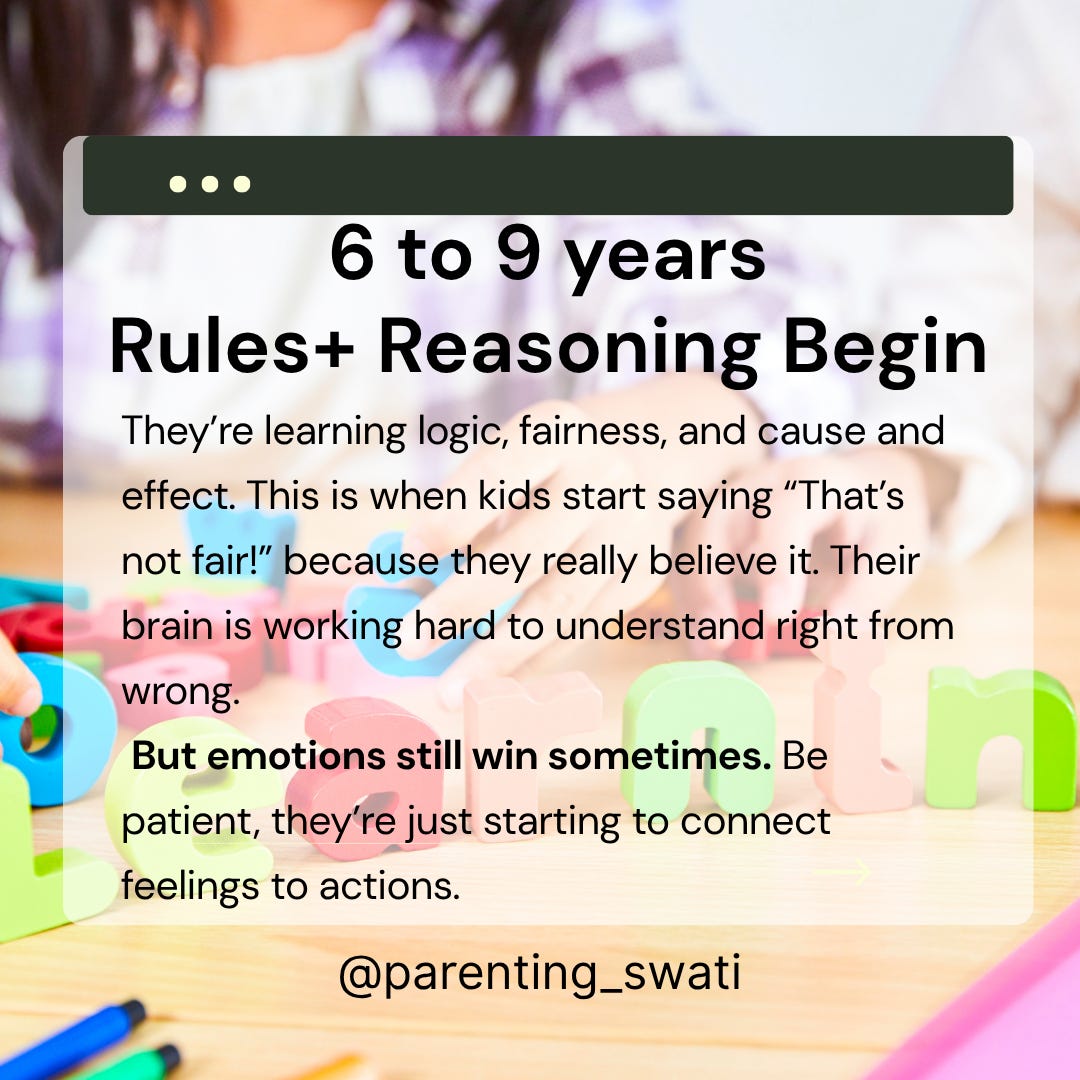Newsletter 35: How Your Child's Brain Grows: A Stage-by-Stage Guide for Conscious Parents
"You're not raising a child. You're growing a mind, a heart, a soul. One breath, one boundary, one embrace at a time."
🌳 Direct Dil se…
A mother in my Joyful Parenting Club recently asked me, "Why does my 14-year-old act so grown-up one moment and like a child the next? I’m exhausted from guessing what version of her I’ll meet each day."
I smiled. Because I’ve heard versions of this question from every stage—parents of toddlers, preteens, and twenty-somethings alike.
What if I told you that your child's confusing behavior isn't misbehavior... but simply brain development in action?
Understanding how your child’s brain grows can shift our parenting from reacting to relating. From panic to perspective. So today, let's walk through the ages and stages—gently, with compassion and cultural grounding.
📊 The Brain at Every Age: A Conscious Parenting Lens
0-2 Years: THE SURVIVAL STAGE
Their brain is growing faster than it ever will again. They can’t think before they act. They feel everything in their body—hunger, fear, tiredness—and react instantly.
In Indian families, this is the age of maalish, lullabies, and cradle songs. These aren’t just cultural traditions—they're powerful brain-builders. Every touch, tone, and tender repetition lays the groundwork for lifelong regulation.
Harvard’s Center on the Developing Child explains that early experiences are built into our bodies and brains. Responsive caregiving in the first years wires the brain for trust and resilience.
They need: Your calm presence. Your voice is their anchor.
3-5 Years: EMOTION OVERLOAD STAGE
Their feelings are big, their logic is tiny. Imagination is booming. They can talk, but still can’t explain what they feel.
Tantrums? They're not a sign of being spoiled. They’re a signal that their nervous system is overloaded. Instead of shame, they need safety.
Dr. Daniel Siegel, author of The Whole-Brain Child, explains that during this stage, the "downstairs brain" (emotions and instincts) dominates, while the "upstairs brain" (logic and control) is still under construction.
They need: Boundaries wrapped in love. Rituals like storytelling or evening aartis can provide structure and soothe.
6-9 Years: RULES + REASONING BEGIN
They’re learning logic, fairness, and cause and effect. Cue: “That’s not fair!” Their brain is working hard to understand right from wrong. But emotions still win sometimes.
They need: Patience and gentle guidance. Family routines like helping set the table or participate in festival preparations offer opportunities for reasoning and responsibility.
Neuroscientist Dr. Bruce Perry reminds us that children this age are starting to build the neural pathways that help them connect cause and effect, but emotional regulation is still developing.
10-12 Years: IDENTITY + SELF-DOUBT START
They begin wondering: “Who am I?” and “Am I enough?” Their thinking becomes more reflective. They care more about how others see them.
This is the age when your belief in them matters more than your praise. Your acceptance becomes their inner voice.
They need: Quiet encouragement, not overcorrection. Let them overhear you speak positively about them.
Dr. Lisa Damour, adolescent psychologist, emphasizes that tweens are in a vulnerable phase of self-esteem development and need attuned adults who reflect their worth back to them.
13-16 Years: RISK + INDEPENDENCE STAGE
The emotional brain is fully online. The logical brain? Still under construction. They crave freedom but struggle with control. Risk-taking and boundary-pushing are common.
They need: Calm, consistent presence. Not a fixer, but a compass. Remind yourself: they’re not fully grown yet, even when they act like it.
MRI studies confirm that the prefrontal cortex—the area for decision-making and impulse control—is still developing in adolescents. Dr. Laurence Steinberg, a leading expert in teen brain research, says this is why teens feel emotions more intensely and are more prone to peer influence.
17-20 Years: PERSPECTIVE GROWS, BUT SUPPORT IS NEEDED
They can plan, reflect, and think ahead. But stress and comparison hit hard. They may act like they’ve got it together, but still need grounding energy.
They need: Unconditional support and space to stumble. Normalize imperfection.
Psychologist Dr. Jean Twenge points to rising anxiety levels in older teens, often due to academic and social pressures. A connected adult relationship can buffer these effects.
20-25 Years: NEARLY THERE, STILL LEARNING
The brain matures around 25. Self-regulation, decision-making, and emotional awareness solidify. They may make mistakes, shift directions, feel lost.
They need: You as a mentor, not manager. Trust their process. Cheer their growth.
The National Institutes of Health highlights that the prefrontal cortex—responsible for executive function—continues developing into the mid-twenties. This means young adults are still forming adult-level judgment.
🔹 What This Means for You
You don’t need to be a neuroscientist to support your child’s growth. You just need:
Curiosity over control
Regulation over reactivity
Connection over correction
Every hug, every pause, every deep breath you take… it shapes the mind and heart of the person they’re becoming.
❓Lets talk and understand you better?
What stage is your child in right now?
What have you noticed about their brain or behavior that surprised you?
Hit reply or leave a comment. I'd love to hear.
💕 Finally …
You're not expected to know it all. You're learning alongside them. There's no perfect response—only presence, effort, and love.
And you're doing that. Truly.
Until next week,
Swati
Parenting Coach| Child Psychologist
Founder, Joyful Parenting Club
Author, Give Your Child Wings
Reserve your spot for the Live Parenting Masterclass and get the opportunity to become a Parenting Coach. Certification and Life Time Membership are also available.
Join my Free live Masterclass to know more.
Get the Amazing Book on Parenting, which has answers to all your hidden questions
“Give Your Child Wings” The Ultimate Parenting Guide
You can connect with me and access to my videos on:
✨ YouTube
✨ Website
✨ Joyful Parenting App: (For Android Users)
✨Joyful Parenting App: (For IOS Users)
Thank you for Reading! Don’t forget to like, share, and subscribe! 😊













